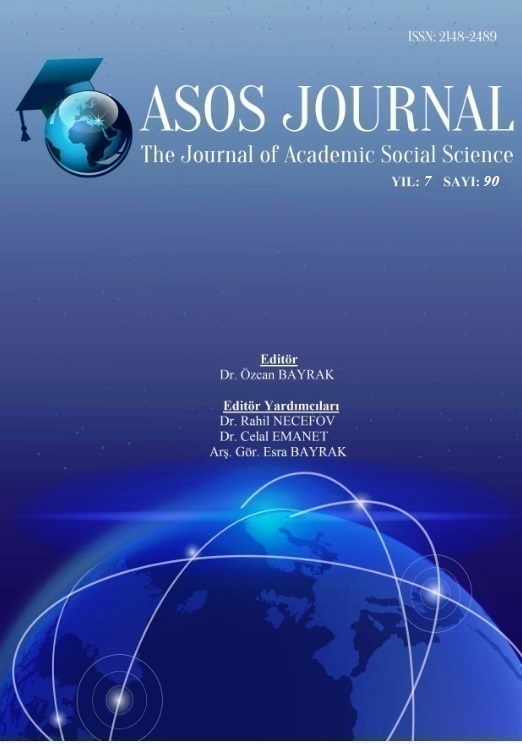Author :
Abstract
Bu çalışmada dünya tarihine iz bırakan en büyük savaşlardan Birinci Dünya Savaşı öncesi, Osmanlı Devleti ile Yunanistan arasında donanma gücünü artırmaya yönelik faaliyetler ve yaşanan rekabet değerlendirildi. Dönemin basını başta olmak üzere arşiv vesikaları ve telif tetkik eserler ile çalışma konusuna katkı sağlanmaya çalışıldı. 1900'lü yılların başında dünyanın en güçlü devletleri, donanması en güçlü olan devletler olmuştu. 1768-1774 Osmanlı- Rus Savaşı, Balkan Savaşları, Trablusgarp Savaşı gibi savaşlar Osmanlının son dönemlerinde en büyük darbenin denizden gelmeye başladığını göstermişti. Balkan Harbinde aldığı mağlubiyet Osmanlı'ya güçlü bir donanma ihtiyacını fazlasıyla hissettirmişti. Donanma Cemiyeti bu amaçla kurulmuş ve halktan toplanılan bağışlarla gemi satın alma faaliyetlerini yürütmüştü. 1911 yılında da İngiltere'deki Vickers Şirketi'ne Reşadiye zırhlısının siparişi verilmiş, gemi komutanlığına da Vasıf Bey tayin edilmişti. 1912 yılına gelinince İngiltere'ye verilen siparişe iki zırhlı Fatih ve Sultan Osman ilave edilmişti. Bu dönemde, daha önceden Brezilya tarafından da İngiltere'deki New Castel'da bulunan Armstrong şirketine bir savaş gemisi ısmarlanmıştı. Brezilya, Rio De Janerio isimli bu savaş gemisinin parasını ödemeyip almaktan vazgeçince bu gemiye Osmanlı Hükümeti talip olmuş ve adını Sultan Osman koymuştu. 1911 ve 1912 yıllarında ısmarlanan Reşadiye ve Sultan Osman zırhlılarının 1914 yılında tamamlanarak teslim edilmesi için anlaşma yapılmıştı. Osmanlı Devleti Londra Büyükelçisi Tevfik Paşa vasıtasıyla İngiliz askeri mühendislerden gemiler için rapor istemiş ancak İngiltere çeşitli bahanelerle gemilerin teslimini geciktirmişti. Osmanlı’nın bu atağına karşı Yunanistan da Amerika'dan iki savaş gemisi almak için harekete geçmişti. Yunan Hükümeti Amerika’dan İdaho ve Mississippi isimli iki gemiyi satın alarak Osmanlı karşısında konumunu güçlendirmeye çalışmıştı. Ayrıca Almanya’dan Selamin adlı dretnotu da sipariş etmişti. 1 Ağustos 1914 yılında Osmanlı, Londra’ya elçilik yoluyla, halktan bin bir güçlükle toplanan gemilerin son taksiti de göndermişti. 28 Haziran 1914 günü Saraybosna'da bulunan Avusturya-Macaristan veliahdı, bir Sırplı tarafından öldürülünce bu hadise Birinci Dünya Savaşının başlamasına yol açmıştı. Bu gelişme üzerine İngiliz hükümeti tedbir amaçlı Osmanlı Devleti tarafından kendilerine sipariş edilen bu gemilere el koyduğunu duyurmuştu. Sadece bu iki gemi değil, aynı zamanda anlaşmaya varılan ve henüz satın alınmayan başka teçhizata da İngiliz hükümetince el konulduğu duyurulmuştu. Bu durum Osmanlı Devleti tarafından protesto edilse de sonuç alınamadı. Osmanlı Devleti henüz savaş fiilen ortaya çıkmamasına ve tarafsız olduğunu duyurmasına rağmen Rusya, İngiltere, ABD, Yunanistan gibi devletlerin kendisine karşı yürütmüş olduğu olumsuz bir diplomatik politikaya maruz kaldı. Bu süreçte deniz gücü ve özellikle Osmanlı Devletinin donanma gücünü takviye etmeye yönelik bedelinin peşin olarak ödendiği iki gemi çeşitli bahanelerle iade edilmedi.
Keywords
Abstract
In this study, the activities and competition to increase the naval power between the Ottoman Empire and Greece were evaluated before the First World War. We tried to contribute to the subject of working with the archives of the period, archive documents and copyright researches. In the early 1900s, the world's most powerful states were the ones which have the most powerful navies. The battles such as the Ottoman-Russian War, the Balkan Wars, the Tripoli War, and the Ottoman Empire in the last period of the Ottoman Empire showed that the biggest coup began to come from the sea. The defeat in the Balkan War made the Ottoman Empire feel a strong need for navy. The Navy Association was established for this purpose and carried out the ship purchase activities with the donations collected from the public. In 1911, Reşadiye battleship was ordered to Vickers Company in England and Vasıf Bey had been appointed as commander of the ship. Two armored Fatih and Sultan Osman were added to the order given to England in 1912. In this period, a battleship had already been ordered by Brazil from Armstrong, which was located in New Castel in England. Brazil did not pay the money and give up getting the ship named Rio De Janerio, when the Ottoman government asked for the ship and named it as Sultan Osman. An agreement was made in 1914 and 1912 for the reintegration of Reşadiye and Sultan Osman battleships in 1914. The Ottoman Empire asked the British military engineers to report for ships through Tevfik Pasha, but the UK had delayed the delivery of ships with various excuses. Against this attack of the Ottoman Empire, Greece had also taken action to buy two battleships from America. The Greek government had tried to strengthen its position against the Ottomans by purchasing two ships, namely, İdahu and the Mississippi. He also ordered the dreadnought named Selamin from Germany. On August 1, 1914, the Ottoman Empire sent the last installment of the ships, which were gathered with a thousand difficulties from the people through the embassy. When the Austro-Hungarian heir in Sarajevo on 28 June 1914 was killed by a Serb, this incident led to the beginning of the First World War. Upon this development, the British government announced the seizure of these ships, which were ordered by the Ottoman Empire. Not only these two ships, but also the other equipment, which was agreed and not yet purchased, were announced by the British government. Although this situation was protested by the Ottoman Empire, no result could be obtained. Despite the fact that the war had not actually emerged and declared neutral, the Ottoman Empire was subjected to a negative diplomatic policy against the states such as Russia, England, USA and Greece. In this process, the two ships that were paid in advance for the reinforcement of the naval power and especially the naval power of the Ottoman Empire were not returned with various excuses.





